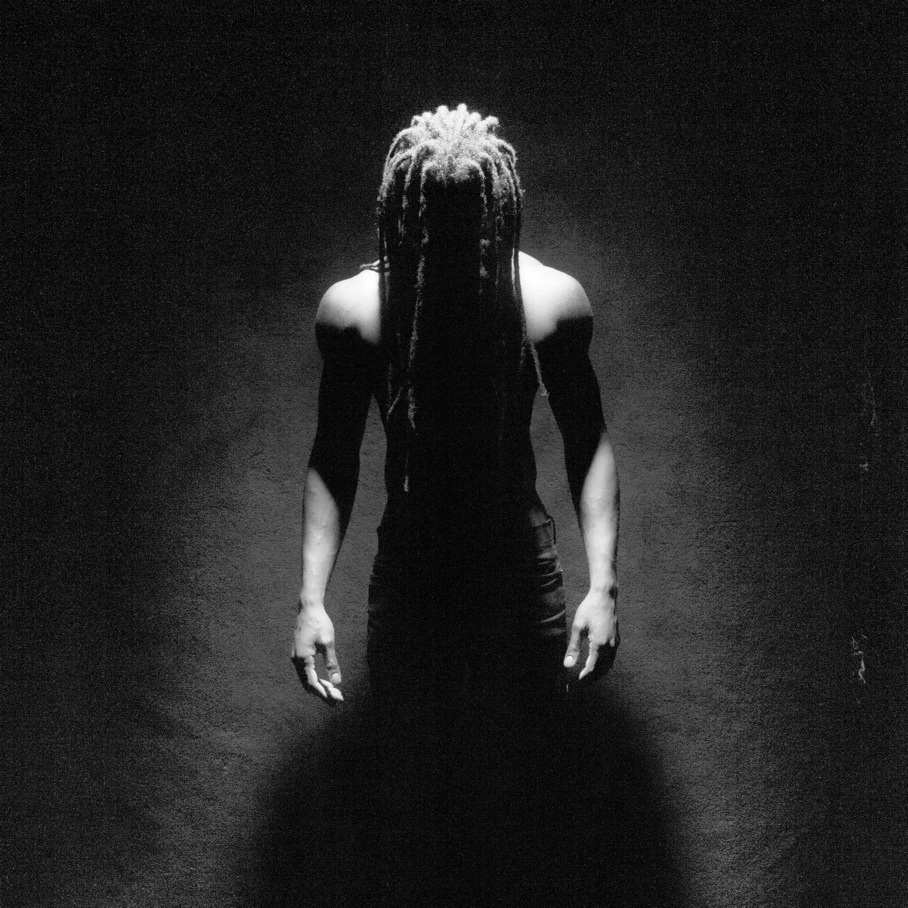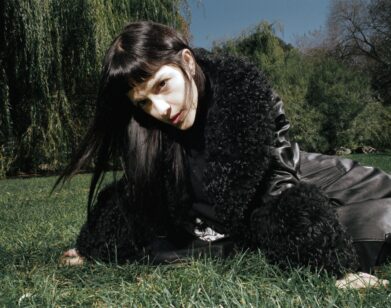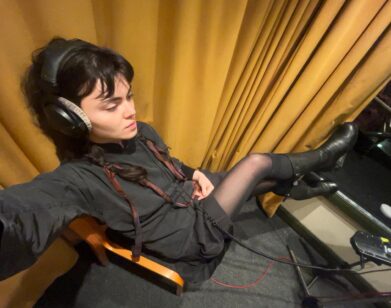The First Layer of Ofei

ABOVE: OFEI
With only a handful of shows to his name and no biography online, London singer, songwriter, and producer Ofei has been a tricky person to write about up until now. And until this one, he didn’t do interviews. So it was a privilege to be the first person to sit down with the enigmatic musician and get to learn a little more about him for Interview.
If you haven’t been one of the lucky ones to catch him supporting the likes of Kendrick Lamar and Shaggie Otis on tour, check out his free EP, London, which crashed his Bandcamp site within three hours off uploading due to over-demand. It’s hardly surprising. There are few breaking musicians more compelling and intelligent in their music-making—his sound a juxtaposition of raw power and aching vulnerability, minimalist, yet deeply rich and dynamic. Just as his lyrics are “completely autobiographical but at the same time riddles, rhymes, and metaphors,” so were his intriguing responses to our questions, which gave rise to more questions than answers.
RUBENSTEIN: Can you tell me about your musical background?
OFEI: I take my hand to anything musical. I’ve dabbled with all instruments, different sounds, different genres. I’ve been in rock bands, I’ve been in hip-hop bands, played piano in jazz bars and restaurants. If there’s a musical task to do, I’ll do it.
RUBENSTEIN: When did you decide to make music your career?
OFEI: I knew from an early age but the instruments didn’t really get me until I was about 17 or so.
RUBENSTEIN: Your sound is a challenge to sum up. If you had to, which three words would you choose?
OFEI: Soul, love, energy.
RUBENSTEIN: Who are your major musical inspirations?
OFEI: The list goes on and on. When I was really young I would have said Todd Edwards. Then I was really big on Chick Corea. Then I had a huge thing with soul, which lasted probably the longest. I just got lost in that world.
RUBENSTEIN: What does the title track of your EP London mean to you?
OFEI: That song represents a moment of my life. A moment where an array of very powerful and very memorable stuff happened to me. A moment of realizing that your life has changed and you have to make a hard and fast decision.
RUBENSTEIN: You kept your identity pretty covered up—what were your motives for doing that?
OFEI: There wasn’t any motive really. I tried to respect the process from concept to master. I was just respecting the song. I don’t think it would have sold the song well if I was there trying to perform this specific moment in my life.
RUBENSTEIN: Where do you draw your lyrical inspiration from?
OFEI: Family, friends and my life. I’ve lived a very broad life in many ways so I have lots of stuff to draw upon. My family is a bunch of characters. But this whole album is inspired from a specific point of my life so it’s very easy. It was so vivid—so it was easy to output songs from that moment.
RUBENSTEIN: Can you elaborate?
OFEI: It was May 28, 2011. That was the start of the beginning. Something happened and I made a change in my life. I ended up with a friend on Brick Lane, East London, putting the world to rights. The next morning things changed.
RUBENSTEIN: For the better?
OFEI: Yes. It didn’t seem like it at the time.
RUBENSTEIN: Are you in the process of making a new album?
OFEI: I’m just putting it together now. It’s an album representative of energy and resolution. I paint a picture of hardship in many ways, however I always try to resolve and love.
RUBENSTEIN: Is making music healing for you?
OFEI: This album was my therapy. Eighty percent of this album I had no intention of ever playing to anyone. This is my therapy.
RUBENSTEIN: Would you consider yourself more a producer or singer?
OFEI: I’m a curator of musical content. I wrote, produced, and played all instruments on the album in its entirety.
RUBENSTEIN: Are there any artists who you dream about collaborating with?
OFEI: I want Quincy Jones to produce an album for me.
RUBENSTEIN: What are your ambitions?
OFEI: Just to be the best version of myself. And regarding my music, my music is me. If I’m happy at the piano, happiness will resonate from the piano. If I’m sad at the piano, likewise. I never really try to manipulate the moment.
RUBENSTEIN: You’ve taken an underground approach thus far, playing only a handful of gigs, and doing no press. What are your thoughts on fame?
OFEI: Listen, I want the world to hear my music. But fame? I have no interest in what most people would deem as fame at all. I can’t even describe how little I care about that. But talking to you is cool. There’s a balance.
RUBENSTEIN: What is your favorite track from your upcoming album?
OFEI: The title may change, but there’s a song at the moment called “Pandora.” I just feel like I got it all off my chest in that song, without meandering. Certain songs you feel like you could express things a little bit more when they’re finished, but here I just captured what I wanted to say.
RUBENSTEIN: The way that you’ve answered thus far makes me curious to hear the album and your story. Was it your intention today to not give too much away?
OFEI: No, it’s just that I don’t think that you’ve got enough time to sit here and get into my life. I’m looking out for you! [laughs] All will be revealed.
RUBENSTEIN: What are your plans for 2014?
OFEI: I want to be on the road as much as possible. There’s a few EPs coming as well as the album. I’ll be at SXSW and there are some other US dates in the pipeline.
RUBENSTEIN: Do you enjoy live shows?
OFEI: I love them. Last year I was on my own, just me and a keyboard. This year I have a three piece band.
RUBENSTEIN: Finally, what are your interests outside of making music?
OFEI: [long pause] Sleep? It was always music. There was never a backup plan.
OFEI’S FIRST OFFICIAL EP, LONDON, IS OUT IN THE US TODAY, JANUARY 28. TO DOWNLOAD IT, PLEASE VISIT THE ARTIST’S BANDCAMP.






